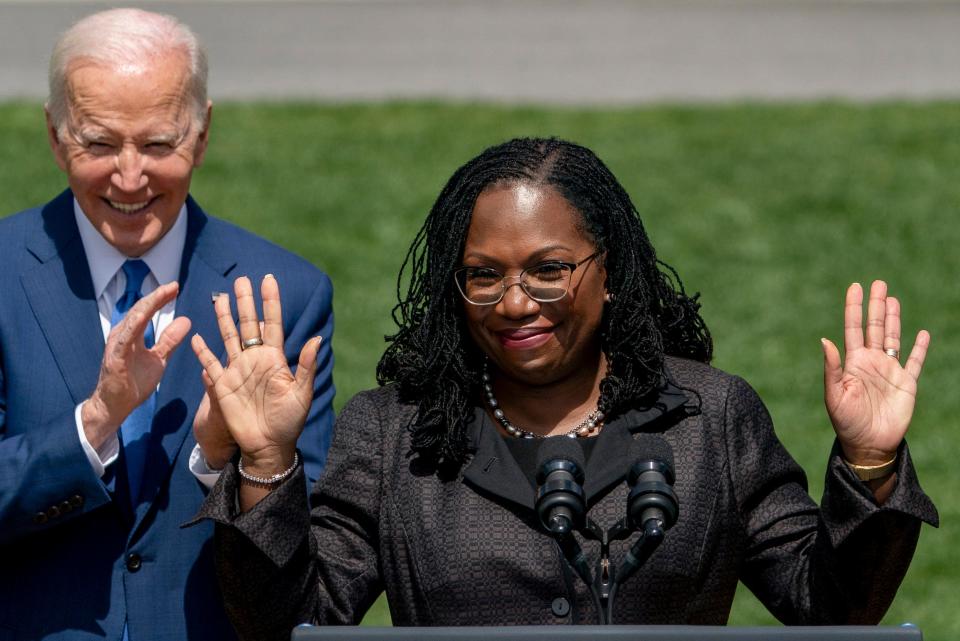Constitutional questions, cafeteria choices await Ketanji Brown Jackson at Supreme Court
- Oops!Something went wrong.Please try again later.
- Oops!Something went wrong.Please try again later.
- Oops!Something went wrong.Please try again later.
- Oops!Something went wrong.Please try again later.
WASHINGTON – In claiming her seat on the Supreme Court, Judge Ketanji Brown Jackson is rising to the pinnacle of the legal profession. But she’ll nevertheless be responsible for holding the door and helping choose the lunch options in the cafeteria.
At an institution steeped in tradition, it's all part of the ritual – some have called it "hazing" – for the court's junior justice.
Jackson, 51, will open the door whenever there's knock outside the court’s storied conference room, where justices debate cases in private – but still like to have a clerk deliver a law book or a coffee. She’ll also be responsible for taking notes during the conference meetings and will serve as a liaison to the cafeteria committee.
"Literally, if there is a knock on the door and I don't hear it there will not be a single other person who will move," Associate Justice Elena Kagan told an audience at Princeton in 2014. "They'll just all stare at me until I figure out: 'Oh, I guess somebody knocked on the door.'"
"I think that's a form of hazing," Kagan quipped.
Jackson, currently a judge on the U.S. Court of Appeals for the D.C. Circuit, was confirmed by the Senate 53-47 on Thursday, faster than all but one of her soon-to-be colleagues. When the Harvard-educated lawyer and Miami native is sworn in this summer, she will be the first Black woman to serve on the high court, the first who previously worked as a federal public defender and will arguably have more experience with the federal sentencing guidelines than any of her colleagues.
Diversity: Judge Jackson's Supreme Court confirmation ends idea of 'Black seat'
Timing: Jackson confirmed in a hurry. Getting on the Supreme Court? That'll take time.
None of that experience will spare her from the tasks required of the junior justice.
One of those jobs involves sitting on the court’s cafeteria committee, leaving them vulnerable to ribbing and roasts from the more senior justices. Associate Justice Amy Coney Barrett recently noted Kagan’s contribution of a frozen yogurt machine. Associate Justice Brett Kavanaugh added pizza. Barrett joined the court during the COVID-19 pandemic, which had largely closed the cafeteria until recently.
Speaking this month at the Ronald Reagan Presidential Library, Barrett said she wanted to add Starbucks to the cafeteria only to discover that idea was already in the works – and is now in place.
"It really is very lovely," Barrett said of the cafeteria, located on the ground floor of the courthouse. "And I had nothing to do with it."
Another injustice for the junior justice comes in the form of opinion writing assignments, which often involve more dry cases for the least senior member. While the court last year dealt with blockbuster issues such as LGBTQ rights and access to the voting booth, Barrett’s first opinion involved an environmental group that sued the U.S. Fish and Wildlife Service over a records request. She ruled for the government.
Kavanaugh’s first opinion was an arbitration case between a dental equipment manufacturer and distributor. Announcing his ruling from the bench, Kavanaugh used the word "arbitrability" 13 times.

Associate Justice Neil Gorsuch’s first opinion dealt with debt collectors, and whether a law intended to guard against abusive debt collection methods applied to people collecting debts owed to themselves. It didn’t, Gorsuch wrote in a unanimous opinion.
Jackson will take over the less-than-weighty tasks from Barrett, who was confirmed and seated in 2020. For at least some of that time, in the early days of the pandemic, the justices were meeting remotely.
In other words, in some sense Barrett had it easy.
Not so for the man Jackson will replace, Associate Justice Stephen Breyer, who was the court’s least senior member for a near-record 11-plus years. Breyer had been grabbing the conference room door for so long that he still leapt to his feet when there was a knock at the door after Associate Justice Samuel Alito was seated in 2006.
"Before I could even start to get out of the chair, Justice Breyer was out of his chair and headed for the door and the chief justice had to say, 'Steve, sit down, that's not your job anymore,'" Alito said in a 2009 C-SPAN interview.
Jackson clerked for Breyer during that period. She, as well as anyone, knows there’s no getting out of it.
When Associate Justice Sandra Day O'Connor became the first woman to serve on the Supreme Court in 1981, some justices worried it could appear she was being treated like a secretary, according to former USA TODAY Supreme Court correspondent Joan Biskupic's biography. But Associate Justice John Paul Stevens, who was relinquishing the task at the time, ruled that, "Everyone should have a turn."
This article originally appeared on USA TODAY: Ketanji Brown Jackson faces 'hazing' as Supreme Court's junior justice

